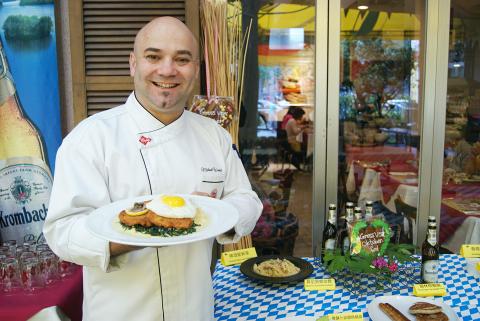It’s party time in Bavaria for the annual Oktoberfest — with good food, beer, dancing, singing, men in Lederhosen and charming Frauleins in bar maid costumes.
Having visited Germany on several occasions, it’s the German-style sausages that I recall most fondly — all washed down, of course, with a mug of German beer. ”Prosit! Wonderbar!”
So when the German Institute in Taipei announced their events for Oktoberfest to take place at Wendel’s Bakery & Bistro in Tienmu, I decided to check out the festivity on Wednesday and get some German-style sausages for lunch.

Photo: Jason Pan, Taipei Times
The bistro was decked out for the official Oktoberfest celebration that evening, with a Bavarian theme decor, and a number of traditional German dishes on display. A stage was set up in the courtyard, with the Bavaria Show Express band from Germany playing for the official functions and party that evening.
Work hard, party hard
Owner Michael Wendel, master baker and chef, said this is the 8th year co-organizing Oktoberfest special events in Taipei, and they always receive an enthusiastic response from locals.
“Oktoberfest is a special time, and Taiwanese people can see the other side of German people. We work hard, but can also play hard, and have fun partying, enjoying good food, good beer, music and dancing,” he said.
In front of the restaurant, a queue was forming for the buffet lunch (NT$360), which includes a selection of salads, cold cuts, tapas dishes, and assorted deserts, including German Black Forest chocolate cake.
Where’s the sausage?
However, something was missing. I came to eat like a big hearty German at Oktoberfest, but my fancied German sausages were not on the buffet.
With determination to have what real Bavarian men must feast on for Oktoberfest, I had no alternative but to order the sausage platter (NT$425) dish from the menu.
Wendel’s Sausage Pan, as it is called, has four kinds of sausage: The Thuringer sausage as its centerpiece (coiled up like a snail spiral), Bavarian white sausage, German cheese sausage and Frankfurter sausage. These were served in a small frying pan, with sauerkraut and a dollop of mashed potato.
The Thuringer sausage (made with lean pork) and the cheese sausage are delicious, with good meaty textures, accentuated with their spicy and cheesy flavors.
I was also looking to relish the Bavarian white sausage. However, it was a bit too soft and a bit on the flaccid side, and seemed to languish in an undistinguished supporting role. For the frankfurter sausage, it tasted like a stronger tough-guy version of the garden-variety frankfurter wiener, but otherwise it did not win high distinction.
The slight disappointment of the two supporting role sausages aside, the experience did bring back fond memories of past delightful meals in Germany. At a total NT$468 (at NT$425 plus 10 percent service charge), it’s a bit pricey for us working journalists on a limited budget.
A server told me that the sausage platter (or another main course) can be added to the lunch buffet for an additional NT$260. During the Oktoberfest offering (ends Oct. 24), authentic German brews — Erdlinger Beer and Krombacher Beer — are available, while the buffet lunch has added special Bavarian dishes. On the Net: www.wendels-bakery.com

April 14 to April 20 In March 1947, Sising Katadrepan urged the government to drop the “high mountain people” (高山族) designation for Indigenous Taiwanese and refer to them as “Taiwan people” (台灣族). He considered the term derogatory, arguing that it made them sound like animals. The Taiwan Provincial Government agreed to stop using the term, stating that Indigenous Taiwanese suffered all sorts of discrimination and oppression under the Japanese and were forced to live in the mountains as outsiders to society. Now, under the new regime, they would be seen as equals, thus they should be henceforth

Last week, the the National Immigration Agency (NIA) told the legislature that more than 10,000 naturalized Taiwanese citizens from the People’s Republic of China (PRC) risked having their citizenship revoked if they failed to provide proof that they had renounced their Chinese household registration within the next three months. Renunciation is required under the Act Governing Relations Between the People of the Taiwan Area and the Mainland Area (臺灣地區與大陸地區人民關係條例), as amended in 2004, though it was only a legal requirement after 2000. Prior to that, it had been only an administrative requirement since the Nationality Act (國籍法) was established in

Three big changes have transformed the landscape of Taiwan’s local patronage factions: Increasing Democratic Progressive Party (DPP) involvement, rising new factions and the Chinese Nationalist Party’s (KMT) significantly weakened control. GREEN FACTIONS It is said that “south of the Zhuoshui River (濁水溪), there is no blue-green divide,” meaning that from Yunlin County south there is no difference between KMT and DPP politicians. This is not always true, but there is more than a grain of truth to it. Traditionally, DPP factions are viewed as national entities, with their primary function to secure plum positions in the party and government. This is not unusual

US President Donald Trump’s bid to take back control of the Panama Canal has put his counterpart Jose Raul Mulino in a difficult position and revived fears in the Central American country that US military bases will return. After Trump vowed to reclaim the interoceanic waterway from Chinese influence, US Defense Secretary Pete Hegseth signed an agreement with the Mulino administration last week for the US to deploy troops in areas adjacent to the canal. For more than two decades, after handing over control of the strategically vital waterway to Panama in 1999 and dismantling the bases that protected it, Washington has